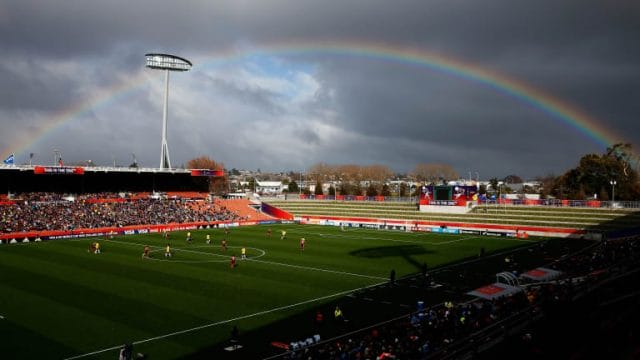- FIFA Women’s World Cup 2023 CEO appointed, begins role on 14 June
- Dave Beeche was previously CEO of FIFA U-20 World Cup in 2015
- ‘Partnerships key to delivering a world-class experience and event’ says new CEO
FIFA announced today the appointment of Dave Beeche as the new CEO of the FIFA Women’s World Cup 2023 in Australia and New Zealand.
Before officially beginning his role on 14 June, FIFA.com spoke to Dave about the appointment, his experiences delivering successful major events and what fans and teams can expect at the next FIFA Women’s World Cup in 2023.
Congratulations and a very warm welcome as the new CEO in Australia & New Zealand for the FIFA Women’s World Cup 2023. Tell us a little bit about yourself and how excited are you to take up your new role.
I’m hugely honoured and excited to be appointed to the role. I have two daughters who play football and have had that first-hand opportunity to see the important lessons and positive impact that football can have on developing young people, especially teenage girls. I have also been lucky enough to be CEO for the 2015 FIFA U-20 World Cup in New Zealand, which I really enjoyed, and was a huge success.
The FIFA U-20 World Cup in New Zealand left a positive legacy for football in New Zealand and made a lasting impact. Five years on I still catch people talking about the tournament, how great it was to see the likes of Brazil and Serbia in the final in Auckland, and [to experience] all that noise, colour and excitement that comes with football at a world-class level. The focus on women’s sport in Australia and New Zealand at the moment, and globally as well, means it is a really exciting time to be involved and I’m really looking forward play a part in helping the exponential growth of women’s sport.
The FIFA Women’s World Cup in 2023 will be a major milestone and a chance to create a lasting legacy for women’s football both in Australia and New Zealand, and around the world. What does the tournament represent and mean to you in that respect?
Whilst football might not be the number one sport at the moment in Australia and New Zealand, unlike other parts of the globe, the opportunity to bring a tournament of this significance to both countries represents an incredibly exciting opportunity to accelerate and grow the sport. While both countries enjoy positive levels of participation at a junior level, the FIFA Women’s World Cup in 2023 will also be real opportunity to help leave a lasting legacy in so many other areas of the game – both on and off the pitch – as well as wider society. The potential impact is incredible.
As we saw in France, the FIFA Women’s World Cup 2023 will also be an amazing platform to create a new generation of role models. The Matildas in particular are a world-class team already and will have a tilt at the title. New Zealand also have an exciting generation of players coming through for 2023, including a number of players who were in the team that finished 3rd at the FIFA U-17 Women’s World Cup in 2018.
As a tournament organiser, I’m excited though to join FIFA again and play a role in creating the best-possible stage and platform to showcase the incredible talent that these players have, as well as helping to put on a world-class event for fans across Australia and New Zealand and around the world.
This isn’t the first time you’ve led a FIFA tournament having previously been CEO for the FIFA U-20 World Cup in 2015. What lessons will you apply from that role, as well as other leadership positions you’ve held in sport, tourism and major events sector?
To deliver a successful event, it is all about partnerships. Delivering key successful partnerships with governments, hosts cities, member associations will all be instrumental in ensuring a successful tournament.
Then I think making sure we create a world-class experience and atmosphere for athletes, for fans and for anyone attending or watching the tournament. If we can design those in a way that delivers a world class experience, as well as a lasting legacy, for key audiences and stakeholders, then it will make the tournament a success. That will be the focus, as well as taking learnings from running the U-20s last time and running a trans-Tasman business in the last five years as CEO of Ironman Oceania. That trans-Tasman experience will be particularly helpful in working with both co-hosts and ensuring there is a consistent experience that we can deliver to both the players and the fans.
This is a landmark and historic tournament for many reasons: first co-hosted FIFA Women’s World Cup, first edition with 32 teams, first time a FIFA Women’s World Cup hosted between two confederations, as well as nine Host Cities and a record ten stadia across Australia and New Zealand. What can we expect from fans, Host Cities and the two co-hosts in 2023?
I think the excitement and support from both countries is going to be fever pitch. I don’t think there could have been better timing to host this tournament in Australia and New Zealand. The massive support and momentum for women’s sport in both countries is phenomenal. I think the public will really get behind it and appreciate seeing and supporting the world-class talent that is going to be here on our shores.
The fans can expect an outstanding display of hugely talented football and an exceptional experience in the stadiums. The teams and players can expect the famous hosting, hospitality and friendliness that the Australian and New Zealand cultures are famous for, as well as a professional and safely run tournament.



